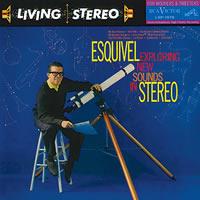Zu! Zu! Zu! Speakers Corner Reissues Early Esquivel Album
For sound adventurers in the early days of stereo, no one’s musical arrangements fit the bill like Esquivel’s. They make Enoch Light’s close-miked percussive stuff on Command sound like punk-rock.
Esquivel brought a more colorful Latin sensibility to his souped-up for stereo arrangements, littering the soundstage with exotic percussion, electric guitars, flutes, xylophones, and spicy brass set to cha-cha and other steamy beats. Most of all though, Esquivel’s arrangements are most notable for the background singers, who sing “Zu, zu, zu” in place of the lyrics.
Pair these kitschy arrangements with RCA’s then-new Cinemascopic “Living Stereo” recordings (in this case captured at the acoustically superb Webster Hall in NYC), and you have the aural equivalent of a raucous pin ball machine, with amusing surprises lurking around every turn as Esquivel shoots shiny silver balls of sound at you from every angle.
The tunes Esquivel appropriates for his musical playground on this set include chestnuts (even back then!) like “My Blue Heaven,” “The 3rd Man Theme,” “Boulevard of Broken Dreams” and even the main theme to Miklos Rozsa’s “Spellbound.”
This is goofy stuff, so outrageous, over the top and un-hip it was only a matter of time before it became ultra-hip and beyond cool as the “lounge music” craze took hold during the 1990’s.
Suddenly, Esquivel albums (there are lots of them on RCA went from the dollar to the collectible bins, fetching $50 and up. Just the other day at the annual WFMU Record Fair, I spotted a copy of this one going for $40—and not in such great condition.
The Speakers Corner reissue gives you a pretty close facsimile of the original’s enormous, airy soundstage, and its pristine, sharply drawn transients. It’s not as good as an original—not as transparent or open—but it’s pressed on super-quiet vinyl and the dynamics might be a tad wider. In any case, it’s good enough that if you don’t hear the original you won’t be disappointed.
Be sure to read Frank Doris’s great feature on the late composer/arranger/conductor who is probably more popular today than he was in his heyday.


